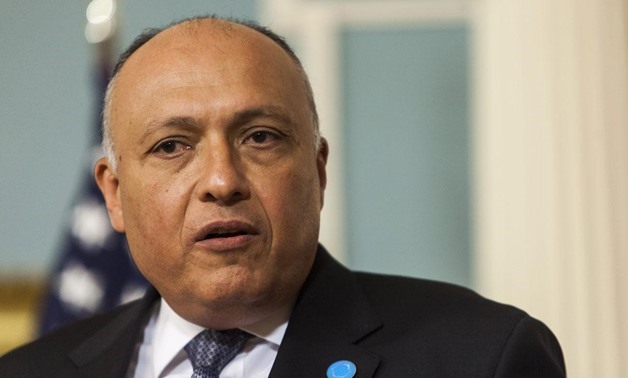
FILE- Minister of Foreign Affairs Sameh Shoukry – press photo
CAIRO – 28 May 2018: Egyptian Foreign Minister Sameh Shoukry will hold a meeting with his newly appointed Sudanese counterpart, Dirdiri Mohamed Ahmed, on Tuesday in Cairo, according to a statement from the Egyptian Foreign Ministry on Monday.
The meeting will tackle international issues of mutual concern and bilateral relations, which witnessed a breakthrough a few months ago. A joint press conference will be held following the meeting, the statement added.
On May 25, Shoukry said that Egypt is building mutual trust with both of Sudan and Ethiopia regarding the Nile River and water security.
He added in statements to national television that the Nile River issue is a matter of national security and is linked to the three countries’ future. “Egypt is working hard on managing the Grand Ethiopian Renaissance Dam (GERD) issue and keen to finish it according to the fixed and agreed timetable between the three countries,” Shoukry said.
Egypt depends entirely on Nile water for drinking and irrigation purposes, reiterating consistently its “historical right” to the river guaranteed in the 1929 and 1959 Nile agreements, which granted the country 87 percent of the Nile’s water and the right to veto or approve irrigation projects in the upstream countries.
Since 2014, the three countries (Egypt, Sudan and Ethiopia) have held several tripartite meetings and agreed on the Declaration of Principles. However, the difference between the countries relates to the filling and operation of the dam; Egypt demands that this period be seven to ten years, while Ethiopia insists on a maximum of three years.
Egypt’s average water per capita is expected to drop from 663 cubic meters per year to 582 cubic meters by 2025, according to the Central Agency for Public Mobilization and Statistics (CAPMAS). Addis Ababa, however, claims that the dam is necessary for Ethiopia’s development and will not harm downstream countries.
In 2011, Ethiopia started the construction of the 6,000-megawatt Renaissance Dam over the Blue Nile River, one of the major sources of water that forms the Nile River downstream. Concerns have risen in Cairo and Khartoum over the negative impact the Ethiopian dam will have on their historic Nile water share, amounting to 55.5 billion cubic meters in Egypt only, in accordance with the historic 1959 agreement with Sudan.
Comments
Leave a Comment